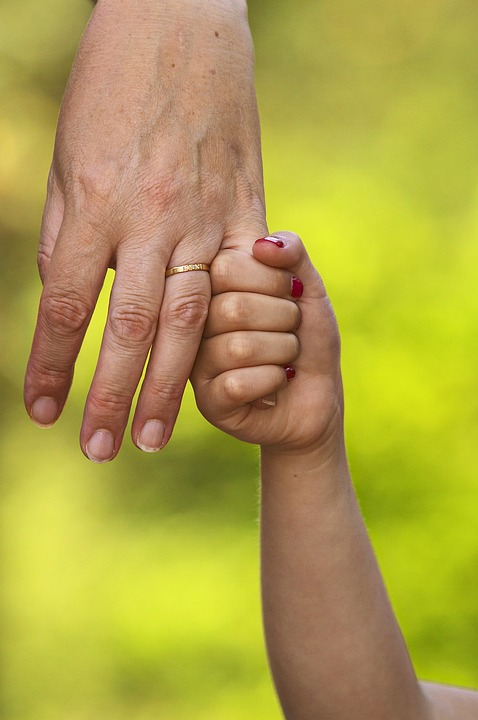 As I left my kids’ daycare this morning, I passed by a mom who was hiding in the doorway, listening to her toddler screaming her name over and over, a pained look on her face. I gave her a hopeful smile and said, “It does get easier, I promise.” She nodded grimly, making it clear that my reassurance didn’t do much to alleviate the pain and guilt that was tugging at her heart in that moment.
As I left my kids’ daycare this morning, I passed by a mom who was hiding in the doorway, listening to her toddler screaming her name over and over, a pained look on her face. I gave her a hopeful smile and said, “It does get easier, I promise.” She nodded grimly, making it clear that my reassurance didn’t do much to alleviate the pain and guilt that was tugging at her heart in that moment.
We’ve all been there. It’s hard enough to leave our children in the care of others, whether it’s for work, socialization, or that highly anticipated first week of Kindergarten. But to hear them screaming and calling out our name, desperation in their tears, makes the act of leaving them nearly impossible.
My kids have put me through the ringer with drop offs over the years. My youngest one is especially skilled at making me feel like the worst mom ever by clinging to my legs and screaming my name as I walk away, interspersing frequent high pitched wails just to get her point across.
Rest assured she is always happy and laughing less than 3 minutes later. I’m anticipating her being very active in the drama club at school in a few years.
As tormenting as this transition can be for us, I am lucky enough to have amazing daycare teachers who give fantastic advice on not only how normal this behavior is, but how best to handle it.
Here are some tips on how to make drop off as pain-free as possible.
1) Don’t stick around. Of all the childcare providers I’ve talked to, this is hands down the #1 most common advice given. While well-intended, staying to read your child a book, hug them one (or ten) more times, or sit with them until they calm down actually reinforces the behavior and makes it harder for the child to separate. It sends the message: the harder and louder I cry, the longer my mom will sit here and hug me. So while it feels totally horrible to leave your child screaming, the best thing to do is get in and get out and let the childcare provider take over.
If this is hard for you, make sure you find a center or school where you feel confident they can manage this behavior lovingly and supportively. With every new class, I’ve always asked the teacher how they handle rough days and drop offs to make sure we are on the same page.
2) Have a set routine. Right now ours is: hang up backpack, put away lunch, wash hands, give a big hug, say goodbye. It doesn’t matter what the routine is, just pick one that works for you and stick to it. Consistency here is key. It’s helpful for your child to know what’s coming next so they aren’t worried that you might sneak off while their back is turned. Knowing what to expect is 90% of the battle with kids.
3) Bring a comfort item. My daughter did much better once she started bringing a toy or lovie each day. She was excited to share it with the class, and the teacher agreed she could hold onto it for 5-10 minutes before putting it in her cubby.
4) Be reassuring. Our kids feed off of our emotions, so make positive, affirmative statements that convey your confidence in your child, such as “Today is going to be a great day,” Or “I’ll miss you so much, and can’t wait to hear all about your day!”
5) Establish a Goodbye Ritual. One daycare we used had a slide where the kids could climb up, wave goodbye to you through the window, and then slide down into the classroom. It made saying goodbye so much fun. At our current daycare, my daughter picks the window she wants me to wave from, then I walk outside and blow one more kiss before I leave. Sometimes if I walk slow enough, by the time I get there my daughter is already distracted and forgets I’m even there.
6) Try really hard not to go back into the room. If you forget something or need to communicate with the teacher, send a text or email. Unless it’s urgent, avoid going back at all costs. Once your child sees you again, it will be even more tears and that much harder to leave.
7) Check in later. Feel free to call or text the teacher (establish their preferred method of communication ahead of time) to check in and hear how the day is going.
8) Be kind to yourself. This is a difficult transition, and while it’s not causing any permanent damage, it can be a really emotional experience. So allow yourself a few minutes to unwind, cry and collect yourself before starting your day. I found good music or podcast was a much needed distraction on my commute.
Remember, this behavior is normal and ultimately helpful for our children’s overall development. They learn valuable skills including how to negotiate with other caregivers, become more independent, and socialize with other kids. Stay strong mommas!

















